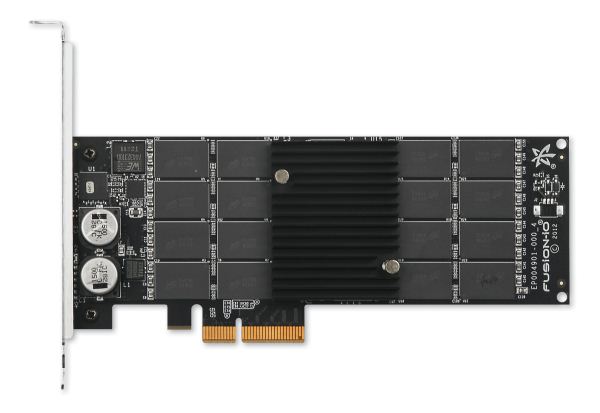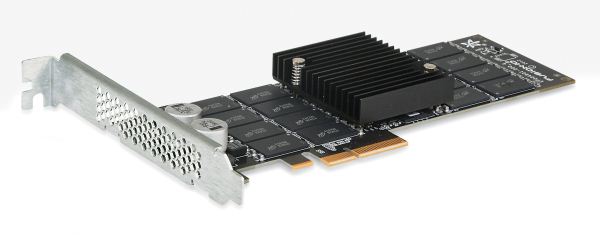
Original Link: https://www.anandtech.com/show/6671/fusionio-launches-ioscale-for-hyperscale-market
Fusion-io Launches ioScale for Hyperscale Market
by Kristian Vättö on January 17, 2013 11:10 AM EST- Posted in
- Storage
- IT Computing
- SSDs
- Enterprise
- Fusion-io

We haven't even had time to cover everything we saw at CES last week, but there are already more product announcements coming in. Fusion-io launched their new ioScale product line at the Open Compute Summit, which was originally started by a few Facebook engineers who were looking for the most efficient and economical way to scale Facebook's computing infrastructure. Fusion-io's aim with the ioScale is to provide a product that makes building an all-flash datacenter more practical, the key benefits being the data density and pricing.
Before we look more closely at the ioScale, let's talk briefly about its target market: Hyperscale companies. The term hyperscale may not be familiar to all, but in essence it means a computing infrastructure that is highly scalable. A good example of a hyperscale company would be Facebook or Amazon, both of which must constantly expand their infrastructure due to increasing amounts of data. Not all hyperscale companies are as big as Facebook or Amazon, though, there are lots of smaller companies that may need as much scalability as Facebook and Amazon do.
Since hyperscale computing is all about efficiency, it's also common that commodity designs are used instead of pricier blade systems. Along with that goes expensive RAID arrays, network solutions and redundant power supplies for instance. The idea is that high-availability and scalability should be the result of smart software, not based upon expensive and - even worse - complex hardware. That way the cost of the infrastructure investments and management is kept as low as possible, which is crucial for a cloud service when a big portion of the income is often generated through ads or low-cost services. The role of software is simply huge in hyperscale computing and to improve the software, Fusion-io also provides an SDK called ioMemory that will assist developers in optimizing their software for flash memory based systems (for example, the SDK allows SSDs to be treated as DRAM, which will cut costs even more since less DRAM will be needed).
The ioScale comes in capacities from 400GB to up to 3.2TB (single half length PCIe slot) making it one of the highest density, commercially available drives. Compared to traditional 2.5" SSDs, the ioScale provides significant space savings as you would need several 2.5" SSDs to build a 3.2TB array. The ioScale doesn't need RAID for parity as there is built-in redundancy, which is similar to SandForce's RAISE (some of the NAND die is reserved for parity data, so you can rebuild the data even if one or more NAND dies fail).
The ioScale is all MLC NAND based, although Fusion-io couldn't specify the process node or manufacturer because they source their NAND from multiple manufacturers (makes sense given the volume required by Fusion-io). Different grades of MLC are also used but Fusion-io is promising that all their SSDs will match with the specifications regardless of the underlying components.
The same applies to the controller: Fusion-io uses multiple controller vendors, so they couldn't specify the exact controller used in the ioScale. One of the reasons is extremely short design intervals because the market and technology is evolving very quickly. Most of Fusion-io's drives are sold to huge data companies or governments, who are obviously very deeply involved in the design of the drives and also do their own validation/testing, so it makes sense to provide a variety of slightly different drives. In the past I've seen at least Xilinx' FPGAs used in Fusion-io's products, so it's quite likely that the company stuck with something similar for the ioScale.
What's rather surprising is the fact that ioScale is a single-controller design, even at up to 3.2TB. Usually such high capacity drives use a RAID approach, where multiple controllers are put behind a RAID controller to make the drive appear as a single volume. There are benefits with that approach too, but using a single controller often results in lower latencies (no added overhead by the RAID controller), prices (less components needed) and it takes less space.
The ioScale has previously been available to clients buying in big volumes (think tens of thousands of units) but starting today it will be available in minimum order quantities of 100 units. Pricing starts at $3.89 per GB, which puts the 450GB model at $1556. For Open Compute Platforms, Fusion-io is offering a 30% immediate discount, which puts the ioScale at just $2.72/GB. For comparison, a 400GB Intel SSD 910 currently retails at $2134, so the ioScale is rather competitive in price, which is one of Fusion-io's main goals. Volume discounts obviously play a major role, so the quoted prices are just a starting point.








